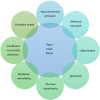Treatment of right ventricular dysfunction and heart failure in pulmonary arterial hypertension
- PMID: 33224779
- PMCID: PMC7666956
- DOI: 10.21037/cdt-20-348
Treatment of right ventricular dysfunction and heart failure in pulmonary arterial hypertension
Abstract
Right heart dysfunction and failure is the principal determinant of adverse outcomes in patients with pulmonary arterial hypertension (PAH). In addition to right ventricular (RV) dysfunction, systemic congestion, increased afterload and impaired myocardial contractility play an important role in the pathophysiology of RV failure. The behavior of the RV in response to the hemodynamic overload is primarily modulated by the ventricular interaction and its coupling to the pulmonary circulation. The presentation can be acute with hemodynamic instability and shock or chronic producing symptoms of systemic venous congestion and low cardiac output. The prognostic factors associated with poor outcomes in hospitalized patients include systemic hypotension, hyponatremia, severe tricuspid insufficiency, inotropic support use and the presence of pericardial effusion. Effective therapeutic management strategies involve identification and effective treatment of the triggering factors, improving cardiopulmonary hemodynamics by optimization of volume to improve diastolic ventricular interactions, improving contractility by use of inotropes, and reducing afterload by use of drugs targeting pulmonary circulation. The medical therapies approved for PAH act primarily on the pulmonary vasculature with secondary effects on the right ventricle. Mechanical circulatory support as a bridge to transplantation has also gained traction in medically refractory cases. The current review was undertaken to summarize recent insights into the evaluation and treatment of RV dysfunction and failure attributable to PAH.
Keywords: Right ventricular dysfunction; heart failure; pulmonary arterial hypertension (PAH).
2020 Cardiovascular Diagnosis and Therapy. All rights reserved.
Conflict of interest statement
Conflicts of Interest: All authors have completed the ICMJE uniform disclosure form (available at http://dx.doi.org/10.21037/cdt-20-348). The series “Right Ventricular Dysfunction” was commissioned by the editorial office without any funding or sponsorship. GH, HJB and MK served as the unpaid Guest Editors of the series. Dr. RJT reports other from Actelion, other from Merck, other from Abiomed, personal fees and other from Medtronic, personal fees from United Therapeutics, personal fees from Arena Pharmaceuticals, personal fees from Aria Inc, outside the submitted work. IML reports grants and other from Actelion, grants and other from AOPOrphan Pharam, other from United Therapeutics, other from Ferrer, other from Astra Zeneca, outside the submitted work. HJB reports grants from Actelion, grants from Ferrer, outside the submitted work. GH reports grants from German Research Foundation, grants from The Federal Ministry of Education and Research, grants from European Pediatric Pulmonary Vascular Disease Network, outside the submitted work. ARH reports personal fees from actelion, personal fees from Bayer, personal fees from complexa, personal fees from PHPrecisionMed, personal fees from united therapeutics, outside the submitted work. The authors have no other conflicts of interest to declare.
Figures
References
Publication types
LinkOut - more resources
Full Text Sources


